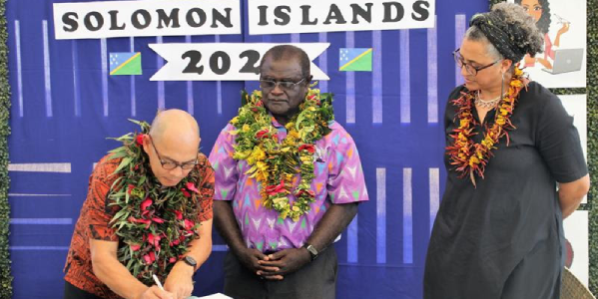Today, the Ministry of Women, Youth, Children and Family Affairs (MWYCFA) and the Pacific Community (SPC) launched a three-year pilot project in the Solomon Islands which gives an exciting opportunity for 40 young people to re-engage in education and training to gain important skills for a better future.
The Pacific Youth Engagement, Empowerment, and Economic Pathways (PYEEEP) project – funded by the New Zealand Ministry of Foreign Affairs and Trade Aid Programme (MFAT) – aims to empower young Pacific Islanders who are not engaged in education, employment, or training (NEET) to improve their social and economic wellbeing. This pilot project is currently being implemented in Tonga and the Solomon Islands with the intention of expanding it to other Pacific Island countries.
The project is designed to strengthen national systems and the national bodies supporting youth-based policies and activities to supplement conventional approaches within the formal education system. It will provide alternative pathways supporting youth to engage in decent work and meaningfully contribute to society. It intends to support Pacific Island governments to establish inclusive services that empower, engage and employ young people, particularly those who have fallen out of education. The strategic goal of the project is that Pacific Island countries improve sustainable development outcomes for youth excluded from mainstream development.
MWYCFA Permanent Secretary Cedrick Alependava said: “The MWYCFA is looking forward to working closely with SPC to deliver this exciting pilot, which will create new opportunities for our youth currently excluded from mainstream development efforts. This project will contribute to our mission to uphold and promote, protect and fulfil the rights of women, young people, children and families through effective partnerships, inclusiveness, fairness and creating equal opportunities to advance the wellbeing of the nation.”

“SPC is proud to be launching the Pacific Youth Engagement, Empowerment and Economic Pathways (PYEEEP) project in the Solomon Islands today alongside the Ministry of Women, Youth, Children and Family Affairs. SPC looks forward to working closely with our project partners over the coming years to deliver positive outcomes for young people in Honiara which can be scaled up and replicated across the region,” said Miles Young, Director of SPC’s Human Rights and Social Development Division (HRSD).
Aotearoa New Zealand High Commissioner to the Solomon Islands Jonathan Schwass sincerely commended the launch of the project: “It is really encouraging to see that 40 young people from Honiara and Guadalcanal who are not in education, employment or training will benefit from this project. We look forward to them returning to their communities and helping other young people to thrive and chart their own paths to success, whatever their background or circumstances. Aotearoa New Zealand recognises the role of young people as future leaders and change-makers in the Solomon Islands. We’re proud to be supporting SPC to implement this pilot youth project in the Solomon Islands.”

According to the International Labour Organisation, the rate of youth NEET in the Solomon Islands is seven per cent, with 5.1 per cent of males and 8.9 per cent of females. Given seven out of ten Solomon Islanders are under 30 years old (UNDP) this means a large number of young people don’t have opportunities in formal education or employment pathways. The project, therefore, aims to support this significant portion of the population with new opportunities to help them find work and contribute to the country’s social and economic development.
SPC is partnering with the Ministry of Women, Youth, Children and Family Affairs (MWYCFA) in the Solomon Islands to deliver the programme. Other project stakeholders in the Solomon Islands include the Solomon Islands National Youth Congress, the Honiara City Council, the Kaotave Rural Training Centre, the Mary Mazzarello Development Centre, and the Solomon Islands Chamber of Commerce and Industries.
– SPC









